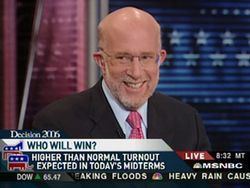Think of this as Volume 12, Number 6 of A-Clue.com, the online newsletter I've written since 1997. Enjoy.
Since the birth of the Republic media and politics have been one.
When the President quoted Washington at his Inauguration, he was in fact quoting pamphleteer Thomas Paine, whose Common Sense and The Crisis made him the Springsteen of that time:
"America, in the face of our common dangers, in this winter of our hardship, let us remember these timeless words; with hope and virtue, let us brave once more the icy currents, and endure what storms may come; let it be said by our children's children that when we were tested we refused to let this journey end, that we did not turn back nor did we falter; and with eyes fixed on the horizon and God's grace upon us, we carried forth that great gift of freedom and delivered it safely to future generations."
The American media went from pamphlets to penny papers, from books to urban newspapers, from radio to TV, and politicians always followed. The wisest cultivated the new media, the most devious also excoriated the old.
We are again in the midst of such a media transformation. We are moving from an age dominated by TV (well, cable) to one dominated by the Internet. This has many implications. Depth over drama, transparency over control, an end to the concept of journalists as gatekeepers to one in which we're enablers, using links to empower our work rather than acting-out.
And so we come again to the threat of newspapers to go out of business, unless they're given financial control over the Internets.
Why should the President turn the new medium's business model on its head for these people?
Will News Corp. become his friend if he does? Will The Washington Post give him a fair shake on its editorial page if he does? Well, no. To even consider such an offer would be for journalists to be sullying their hands — it gives them the vapors just thinking of it.
Here's the harsh political truth.
Influence must be earned, in the marketplace. Only then does it earn respect, and only then does it deserve any. Lincoln respected books, McKinley newspapers, Franklin Roosevelt radio and film, and Nixon TV because these media had earned their way with the public. We trusted these media, making the media's benediction valuable.
The vulnerability of the right is not political. That threat lies in the business model. The business models of every medium dominated by the President's critics is under threat from the Internet. They are begging for a life preserver. The Administration should throw them a boat anchor.
For the last several weeks TV, cable, and newspaper pundits have worked overtime carrying the water of Republican drama queens, who have become masters of both drama and the forms by which these media work — and who coincidentally have been buying it up so they can control the government. The President is playing their game, making dramatic entrances, lovely speeches, becoming a character in their play.
That needs to change.
Bush lawyer Ben Ginsberg successfully gulled Democrats for years into believing that they had to separate from the Web to be legit. He convinced Bill Bradley that webrings were campaign contributions, with his advice the Bush FEC tried to make DailyKos register as a lobbyist, and since the election Republicans have been working to make certain that the Internet assets Obama created in the campaign can't be transferred to the task of governing the country.
But the cost of putting Whitehouse.gov into the clouds should be a rounding error. While the site has a blog, it needs to do much more. It needs to become a community, as different from the current site as Barackobama.com was from Deanforamerica.com. It needs to become a Google into the government, a one-stop shop for anyone who wants to know what the law is, what's available under the law, and how to influence the law.
The President has many political allies within the tech sphere who can help pull this off. But they have to be activated. Someone within the White House needs to ask for the order.
The biggest mistake this Administration has made, so far, is in the Office of Public Liaison. There is not a Web-head in the bunch, and there needs to be. I am certain Eric Schmidt would be happy to recommend someone. A Council of Internet Advisers, modeled on the Economic Recovery Board announced today, should be convened online ASAP to translate the President's online strength during the campaign into resources for the new millenium.
One thing I have learned in the last 23 years covering the Internet. We are still at the beginning of this medium. Still. The beginning. The business models of this medium are constantly evolving, and it will be those who master those business models, who create them, who will be the Rupert Murdochs and Bill O'Reillys of tomorrow.
Accelerating the creation of such entrepreneurs can easily be justified as economic stimulus. All they need are resources and access. These are things the Administration can easily give them.
Do it. They will become your chorus.













